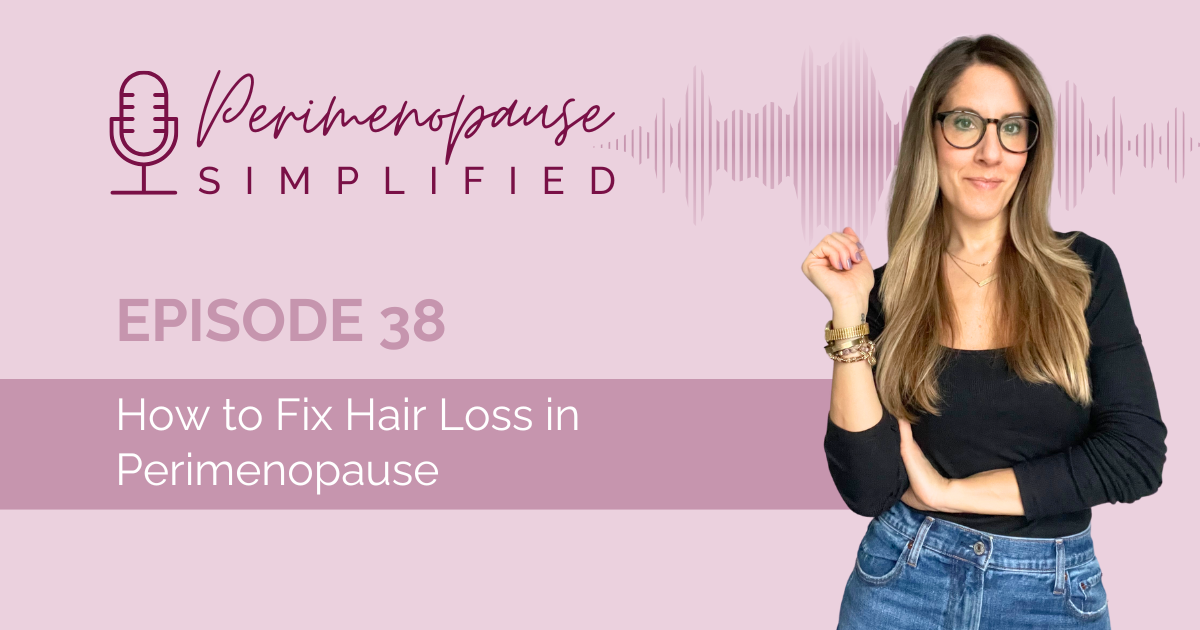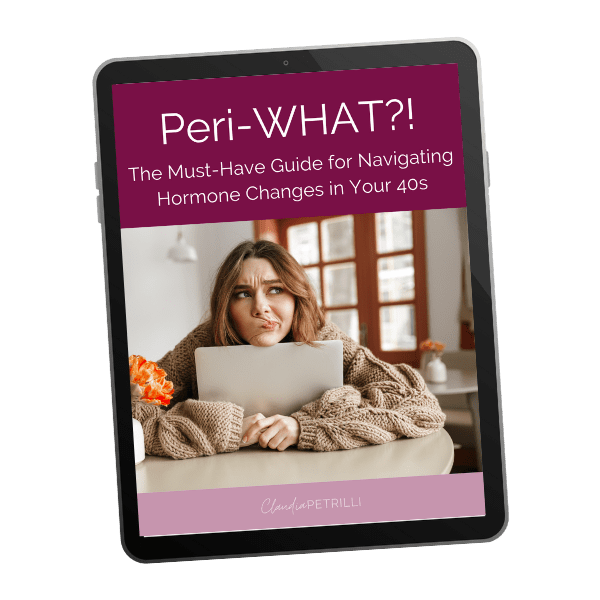
38. How to Fix Hair Loss in Perimenopause
Don’t Miss An Episode!
In this episode, we covered:
- Causes of hair loss in perimenopause
- How estrogen, progesterone and testosterone play a role in hair loss
- Other factors that contribute to hair loss
- How stress and your diet affect hair loss
- The gut health connection to hair loss
- 6 steps to take to fix hair loss
Today, we’re tackling a topic that I know many of you have questions about—hair loss during perimenopause. It’s super common and super frustrating. I’ve dealt with it myself. So we’re going to dive into WHY it happens and what to do about it.
Hormonal Changes and Hair Loss
One of the main reasons behind hair loss or hair thinning is hormonal changes—specifically, the drop in estrogen and progesterone levels. These hormones play a big role in keeping your hair in its growth phase. When their levels decline, the hair growth cycle shortens, meaning more hair falls out and less grows back in.
Additionally, for some women, there’s an increase in androgens, like DHEA and/or testosterone. When this happens, it can cause hair follicles to shrink, leading to thinning hair, especially at the temples and crown. We can also see a decline in these hormones during this time, also causing a loss.
It’s Not Just Hormones
But like I always say, let’s not blame everything on our hormones. Stress, nutritional deficiencies, viruses, illness, and thyroid issues can all be contributing factors.
Thyroid and Hair Health
Many women post-pregnancy and in perimenopause have undiagnosed hypothyroidism, where your thyroid is sluggish. Thyroid plays a huge role in hair health. Thyroid hormones help control the development and maintenance of hair follicles.
So if your thyroid isn’t functioning properly—whether it’s underactive (hypothyroidism) or overactive (hyperthyroidism)—you may notice your hair thinning or even falling out. It’s especially important for women in perimenopause to keep an eye on their thyroid levels since thyroid disorders are much more common during this time. That’s why we recommend our clients get a full thyroid panel to truly see how your thyroid is functioning.
Stress and Hair Loss
And then stress alone can cause hair to shed, especially if you’ve had a significant stressor. It pushes hair follicles into a resting phase, so you may notice a couple of months after the event, your hair starts falling out “suddenly.”
Nutrient Deficiencies
Stress depletes our nutrients, and if you’ve been on medication for years like hormonal birth control, anti-inflammatories, or antibiotics, or followed a vegan or vegetarian diet, you may be missing key nutrients like zinc, iron, selenium, magnesium, B vitamins, and omega-3 fatty acids, all of which impact hair health. Conversely, you may have iron or copper excess, which can also cause hair loss. These two minerals have a direct relationship, which is why we test minerals with clients, especially those who have been on hormonal birth control and/or use a copper IUD.
Other Possible Reasons for Hair Loss
Some other possible reasons for hair loss are:
- Chronic inflammation in the body
- PCOS (Polycystic Ovarian Syndrome)
- Poor gut health (making it difficult to absorb nutrients from food) – which is why we run a GIMAP with clients if their budget allows
- Undereating, a low protein diet, or too low carb diet
- Viruses, like COVID
- Exposure to chlorine or other chemicals in unfiltered water
- Heavy metal toxicity, like lead, mercury, or aluminum (mercury is super common because many of us in our 40s and above have mercury amalgams)
- Alopecia, which is an autoimmune condition and requires gut work, removing offending foods, and addressing stress/trauma
What You Can Do to Manage Hair Loss
1. Focus on Diet
Make sure you’re getting plenty of vegetables, fruit, and quality protein—hair is made of keratin, which is a protein—so don’t skimp on those healthy sources like eggs, lean meats, fish or seafood, legumes, and organic soy.
2. Manage Stress
Chronic stress can lead to increased cortisol, which can further mess with your hair. Finding ways to manage stress—whether it’s through meditation, exercise, or just making more time for things you love—can help reduce its impact on your hair.
3. Use Gentle Hair Care
Avoid tight hairstyles, excessive heat, harsh chemical treatments, or dyeing it frequently. Switch to a gentle, sulfate-free, paraben-free shampoo and conditioners that are designed for thinning hair or hair loss versus harsh chemicals in so many hair care products that irritate your scalp and weaken hair growth over time. Some brands to check out are Innersense, Acure, Mill Creek, Virtue Labs, Vegamour, and Olaplex. Increase blood flow to the scalp by massaging it, brushing it, and combing it.
4. Address Nutrient Imbalances
Make sure you’re getting enough iron, zinc, and other minerals through your diet and/or with supplements. I do recommend testing to see what you need instead of supplementing blindly.
5. Address Gut Dysfunction
Address gut bacteria imbalances, inflammation, gut infections like H. Pylori, lack of digestive enzymes, and stomach acid. Consider working with us to get a GIMAP stool test and personalized protocol.
6. Optimize Your Hormones
This might mean considering hormone replacement therapy (HRT). HRT can be a game-changer when it comes to hair health. It can help rebalance those estrogen and progesterone levels. It can also help with other symptoms like hot flashes, mood swings, and sleep disturbances. But, like any treatment, it’s not a one-size-fits-all solution. It’s important to have a conversation with a practitioner who understands your unique needs and can guide you toward the best approach for your body. This is something we help our clients with.
Final Thoughts
I hope that was helpful to you! If you need more personalized advice or you’re feeling overwhelmed, reach out to me to chat about working together. October enrollment for The Hormone Rescue program is open, and we have a few options to get our support, depending on your needs and budget.
Thanks for hanging with me today! If you found this episode helpful, please subscribe and share it with a friend. Until next time…
Brands mentioned:
Innersense
Acure
Mill Creek
Virtue Labs
Vegamour
Olaplex
Sources:
https://www.ncbi.nlm.nih.gov/pmc/articles/PMC9262270/
https://www.ncbi.nlm.nih.gov/pmc/articles/PMC7432488/
https://www.ncbi.nlm.nih.gov/pmc/articles/PMC8291365/
https://pubmed.ncbi.nlm.nih.gov/30939539/
https://www.ncbi.nlm.nih.gov/pmc/articles/PMC9791053/
Claudia Petrilli is a Functional Health Coach, Integrative Nutrition Coach, Women’s Health Educator, and creator of The Hormone Rescue program. Having experienced debilitating periods, digestive issues, a sluggish thyroid, a pituitary tumor, and perimenopause symptoms in her late 30s, she knows exactly what it’s like to get dismissed by doctors and spend years searching for answers.
Free Resources:
Peri-What?! The Must-Have Guide for Navigating Hormone Changes in Your 40s
Programs:
Connect with Claudia:
Have a question or episode topic suggestion? Please email: claudia@claudiapetrilli.com.
Love the show? Please subscribe, leave a 5-star rating, review, and share with others, so more women can find this podcast for guidance and support through their perimenopause journey!






